- Afrika
- Albania
- Amharic
- Arabic
- Armenian
- Azerbaijani
- Basque
- Belarusian
- Bengali
- Asụsụ Bosnia
- Bulgarian
- Catalan
- Cebuano
- China
- China (Taiwan)
- Corsican
- Asụsụ Croatia
- Czech
- Danish
- Dutch
- Bekee
- Esperanto
- Estonia
- Asụsụ Finnish
- French
- Onye Frisian
- Onye Galisi
- Asụsụ Georgian
- German
- Grik
- Gujarati
- Haitian Creole
- hausa
- Hawaian
- Hibru
- Mba
- Miao
- Asụsụ Hungarian
- Aislandi
- igbo
- Asụsụ Indonesian
- Irish
- Ịtali
- Japanese
- Asụsụ Javanị
- Kannada
- kazakh
- Khmer
- Onye Rwandan
- Korean
- Kurdish
- Kyrgyz
- Ịrụ ọrụ
- Latịn
- Latvia
- Lithuania
- Luxembourgish
- Masedonia
- Malgashi
- Malay
- Malayalam
- Malta
- Maori
- Marathi
- Mongolian
- Myanmar
- Nepali
- Norwegian
- Norwegian
- Occitan
- Pashto
- Asụsụ Persia
- Polish
- Portuguese
- Punjabi
- Romanian
- Russian
- Samoan
- Scottish Gaelic
- Asụsụ Serbian
- Bekee
- Shona
- Sindhi
- Sinhala
- Slovak
- Slovenian
- Somali
- Spanish
- Asụsụ Sudan
- Swahili
- Swedish
- Tagalog
- Tajik
- Tamil
- Tatar
- Telugu
- Thai
- Turkish
- Turkmen
- onye Ukraine
- Urdu
- Uighur
- Uzbek
- Vietnamese
- Welsh
- Enyemaka
- Yiddish
- Yoruba
- Zulu
Eprel. 23, 2023 18:54 Laghachi na ndepụta
Otu esi etinye ngere njikọ Chain
Tupu ịmalite
Chọpụta ma ọ bụrụ na achọrọ ka ị nweta ikike ụlọ na mpaghara mpaghara.
Ngwongwo gị ga-ezute ihe mgbochi akwụkwọ agbataobi.
Mepụta ahịrị ihe onwunwe.
Mee ka ụlọ ọrụ gị dị n'okpuru ala dị. (Blue staked)
If you are having your fence installed by someone, are they covered by Workman’s Compensations Insurance?
Ngwa bara uru maka ịwụnye ngere njikọ njikọ
Ihe teepu
Ọkwa
Pliers
Ndị na-egbutu waya
Sledge Hama
Post Hole Digger
Wheelbarrow, Shọvel na Hoe iji gwakọta na ibugharị ihe
Hacksaw ma ọ bụ Pipe Cutter
eriri eriri / Mason Line na stakes
Ihe mgbawa Crescent
Fence Stretcher (ụdị ratchet ike ịdọrọ, ngọngọ na tackle, ma ọ bụ ngwaọrụ yiri ya. Enwere ike ịgbazinye ọtụtụ ngwaọrụ ịgbatị waya ma ọ bụ gbazite ụlọ.)
|
Ihe achọrọ maka ngere njikọ Chain Residential |
|||
|
Nkọwa |
Foto |
Ọnụọgụ iji |
Ọnụọgụ a ga-azụta |
|
Fabric ngere |
 |
A na-erekarị ya na mpịakọta 50 ụkwụ |
|
|
Ụgbọ okporo ígwè kacha elu |
 |
Mkpokọta eserese nke ngere obere oghere ọnụ ụzọ ámá |
|
|
Mpempe akwụkwọ ahịrị (akwụkwọ n'etiti) |
 |
Kewaa mkpokọta ihe onyonyo site na 10 wee gbakọta (lee eserese dị n'okpuru) |
|
|
Mpempe akwụkwọ njedebe (njedebe, akụkụ, na mkpesa ọnụ ụzọ ámá) (na-abụkarị ibu karịa posts ahịrị) |
 |
Dị ka achọrọ (2 maka ọnụ ụzọ ọ bụla) |
|
|
Akpa ụgbọ oloko kacha elu |
 |
1 maka ogologo nke ọ bụla nke ụgbọ okporo ígwè dị larịị. Achọghị maka ụgbọ okporo ígwè swedged |
|
|
Akpa aka |
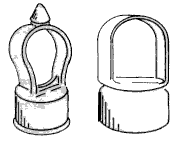 |
Jiri 1 biputere ahịrị (ụdị abụọ egosiri n'aka ekpe) |
|
|
Ogwe obi erughị ala |
 |
Jiri 1 maka njedebe ma ọ bụ ọkwa ọnụ ụzọ ọ bụla, 2 maka nkuku ọ bụla |
|
|
Otu ihe nkwado |
 |
Jiri 1 n'otu ụlọ mmanya ọ bụla (na-ejide njedebe ụgbọ okporo ígwè na ebe) |
|
|
Ụgbọ okporo ígwè kwụsịrị |
 |
Jiri 1 n'otu ogwe esemokwu ọ bụla |
|
|
Band erughị ala |
 |
Jiri 4 n'otu ogwe esemokwu ma ọ bụ 1 kwa ụkwụ nke ịdị elu ngere |
|
|
Ụgbọ ala 5/16" x 1 1/4" |
 |
Jiri 1 kwa esemokwu ma ọ bụ eriri nkwado |
|
|
Mbipute okpu |
 |
Jiri 1 maka nzi ozi ọnụ ọ bụla |
|
|
Nkịtị Tie / nko Tie |
 |
1 maka 12" ọ bụla nke posts ahịrị yana 1 maka 24" ọ bụla nke ọdụ ụgbọ okporo ígwè |
|
|
Ụzọ ije |
 |
|
|
|
Ọnụ ụzọ ámá ụgbọala abụọ |
 |
|
|
|
Hinge nwoke / Post Hinge |
 |
2 kwa otu ụzọ ije na 4 kwa ọnụ ụzọ mbanye abụọ |
|
|
Ụgbọ ala 3/8" x 3" |
 |
1 kwa hinge nwoke |
|
|
Mkpịsị aka nwanyị / ọnụ ụzọ ámá |
 |
2 kwa otu ụzọ ije na 4 kwa ọnụ ụzọ mbanye abụọ |
|
|
Ụgbọ ala Bolt 3/8" x 1 3/4" |
 |
1 kwa nwanyi hinge |
|
|
Fork Latch |
 |
1 kwa ọnụ ụzọ ámá |
|
Nzọụkwụ 1 - Nyochaa ahịrị ihe onwunwe
Jide n'aka na ngere ahụ agaghị agafe ahịrị akụ. Ọtụtụ ndị na-arụ ọrụ ngere na-atụ aro ka edobe ọkwa niile dịka 4 "n'ime ahịrị ụlọ ahụ. Nke a ga-enyere aka izere ịbanye n'akụkụ ihe onwunwe dị n'akụkụ ya na ihe mgbakwasị ụkwụ siri ike. A na-eme nke a n'ụzọ dị mfe site n'ịgbatị eriri n'akụkụ eriri akụ na ịtọ ntọala 4" n'ime.
Step 2 - Locate and set Terminal Posts (corner, end, and gate posts are called terminal posts)
A na-ekpebi ebe dị n'etiti oghere ọnụ ụzọ ámá site na ịgbakwụnye obosara nke ọnụ ụzọ ámá ahụ gbakwunyere ikike maka hinges na latches. Ọtụtụ mgbe, ọnụ ụzọ ámá na-achọ 3 3/4" maka hinges na latches na ọnụ ụzọ mbanye abụọ chọrọ 5 1/2". Na-esote, gwuo oghere.
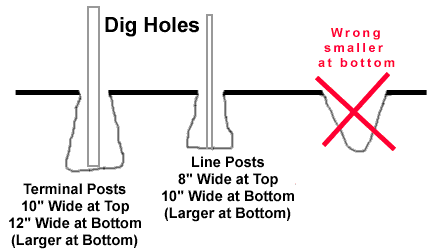
Ekwesịrị ịtọ ọkwa njedebe 2 "dị elu karịa ịdị elu nke ákwà ngere na ahịrị 2" dị ala karịa ịdị elu nke ákwà ngere (ọnụ ọnụ posts kwesịrị ịbụ 4" dị elu karịa posts ahịrị). Ị nwere ike iji simenti 1, akụkụ abụọ ájá, na gravel 4. Enwekwara pre-mix ciment, jiri larịị hụ na posts ndị ahụ kwụ ọtọ, posts kwesịrị ịdị n'ime oghere. mmiri ahụ ga-agbapụ n'ogidi ndị ahụ.
Kwụpụ 3 - Chọta wee tọọ akwụkwọ ozi ahịrị
After the concrete around the terminal posts have hardened, stretch a string tight between the terminal posts. The string should be 4" below the top of the terminal posts. Line posts should not be spaced more than 10 feet apart. For example, if the length between two terminal posts is 30 feet, then line posts would be spaced 10 feet apart (see chart below). ig the post holes and set the line posts. Before concrete begins to set, adjust post height by moving post up or down. Top of the line posts should be even with the string. Check with level to make sure posts are straight.
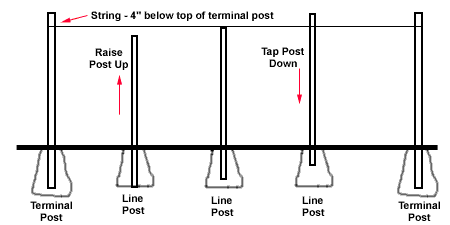
Kwụpụ 4 - Tinye ihe nrụnye n'akwụkwọ ozi njedebe
Lelee ndepụta ihe na eserese dị n'elu. Mgbe etinyechara ọkwa niile na ihe mgbakwasị ụkwụ siri ike sie ike, tụpụ esemokwu ahụ na eriri ihe nkwado n'okwa ndị dị nso. Ogologo elu dị larịị nke eriri esemokwu kwesịrị chere ihu n'èzí ngere ahụ. Lezienụ anya ka ị ghara ịgbasa ma ọ bụ gbagharịa ngwa ahụ. Ugbu a tinye okpu nzi ozi ọnụ.
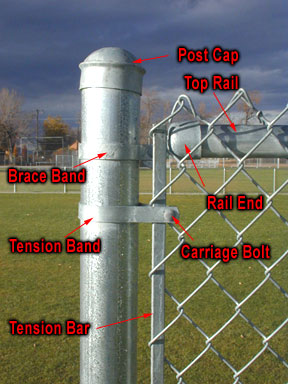
Nzọụkwụ 5 - Tinye Top Rail
Tinye okpu loop n'okwa n'ahịrị. Fanye otu ogologo ọkpọkọ ụgbọ okporo ígwè dị n'elu n'elu anya-elu kacha nso n'otu n'ime ọkwa nkwụsị. Wepụ njedebe okporo ígwè na nsọtụ ụgbọ okporo ígwè dị n'elu ma tinye ya n'ọkwa nkwụsị site na iji eriri nkwado (Ọ bụrụ na ị na-eji swedge top rail, etinyela njedebe swedge na njedebe ụgbọ okporo ígwè). Chekwaa njedebe ụgbọ okporo ígwè na eriri ihe nkwado ahụ site na iji ihe mkpuchi ụgbọ ala. Gaa n'ihu site na ijikọ okporo ụzọ elu ọnụ. Ọ bụrụ na ejighị ụgbọ okporo ígwè swedged, ị ga-ejikọta ọnụ ụzọ ụgbọ okporo ígwè ọnụ site na iji uwe elu ụgbọ okporo ígwè. Mgbe ị rutere n'okwa ọdụ ụgbọ elu nke ọzọ, tụọ nke ọma ma bepụ ụgbọ okporo ígwè dị n'elu ka ọ dabara nke ọma na njedebe ụgbọ okporo ígwè. Nchekwa na njedebe okporo ụzọ ụgbọ okporo ígwè nwere eriri ihe nkwado na ihe mkpuchi ụgbọ ala.
Nzọụkwụ 6 - Hang Chain Link Fabric
Tụgharịa ákwà njikọ yinye n'ala n'akụkụ ahịrị ngere. Ogwe esemokwu mmịfe site na njikọ ikpeazụ na akwa njikọ yinye. Kwuo ákwà ahụ elu ma dina ya na posts. Kpoo ogwe esemokwu ahụ (nke ị tinyeziri) na ebe a na-edebe njedebe ya na ụgbụ erughị ala (nke dị na post). Jiri bolts ihe e ji ebu ihe na isi gaa n'èzí ngere ahụ. Gagharịa n'akụkụ ngere ahụ ma wepụ ihe na-adịghị mma. Jiri eriri waya ole na ole tinye akwa na ọdụ ụgbọ okporo ígwè.
To connect two sections or rolls of fence fabric together - take a single strand of wire from one of the sections of fence (Sometimes it is necessary to remove a second wire on the one end in order for the two sections to mesh properly.). Place the two section of fence next to each other (end on end). Join the two sections by winding (corkscrew fashion) the loose strand down through the fence. Join and tighten the knuckles at bottom and top. Now you shouldn't even be able to see where the two sections were connection together.
To remove excess chain link fence fabric - untie both top and bottom ends of fence (knuckles - pliers shown below). Twist the wire in a corkscrew fashion until the fence comes apart. One picket shown in red is turned until the fence is separated.
Kwụpụ 7 - ákwà njikọ Stretch Chain
Ekwesịrị itinye akwa akwa na njedebe nke ngere ahụ. Fanye mmanya erughị ala (nwere ike ịchọ nke ọzọ) ihe dịka 3 ụkwụ n'ime ngwụcha akwa ahụ anaghị ejikọta ya. Jiri nwayọ kechie otu nsọtụ nke ihe ndọtị ngere n'ogwe erughị ala na nsọtụ nke ọzọ na post njedebe. Gbatịa akwa ahụ - esemokwu ziri ezi kwesịrị ikwe ka obere ihe nye mgbe ejiri aka pịa ya. Ekwesịrị ịdị n'elu akwa ahụ ihe dịka 1/2 "n'elu ụgbọ okporo ígwè dị n'elu. Gbanwee ákwà ka ọ dị ogologo site na ịgbakwunye ma ọ bụ wepụ waya dị ka ekwuru na nzọụkwụ 6. Fanye ihe mgbagwoju anya na njedebe nke ákwà ahụ ma jikọọ eriri esemokwu na njedebe njedebe. Wepu ihe ndọtị ngere. Tinye eriri waya n'elu ụgbọ okporo ígwè dị 24" iche. Tinye eriri waya na posts 12" dịpụrụ adịpụ. Gbanyụọ mkpụrụ n'elu ihe nkwado niile na eriri esemokwu.
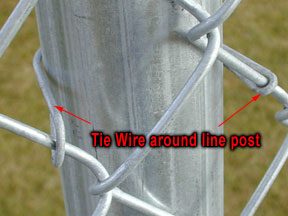
Nzọụkwụ 8 - Hanging Gates
Mgbe e mechachara ngere ahụ, wụnye eriri nwoke ahụ n'otu n'ime oghere ọnụ ụzọ ámá ahụ, kwụgidere elu elu ya na ntụtụ na-atụ ala na mgbada ala na ntụtụ na-atụ aka elu. Nke a ga-egbochi ibuli ọnụ ụzọ ámá ahụ. Tọọ ọnụ ụzọ ámá, na-edozi elu ọnụ ụzọ ámá ahụ na n'elu ngere. Dezie ma mesie hinges ka o kwe ka ọ na-agbagharị. Wụnye latch ọnụ ụzọ maka otu ọnụ ụzọ ámá. Ọnụ ụzọ ámá abụọ na-eji otu usoro mana wụnye ngwaọrụ latching center (ndụdụ latch).
Notes: Post depth can be determined by local weather and soil conditions, terminal posts are normally dug 10" wide and 18" to 30" deep. Depending on the wind and soil conditions you may want to use 8' centers or even a more narrow spacing for line posts. You may want to use longer line or terminal posts depending on the wind and soil conditions in your area. If you want to add privacy slats in the future, make sure the frame work will be strong enough for additional wind load.
Orange barrier fencing mesh is an extruded polypropylene plastic mesh fencing for cordoning off building sites, construction sites, sporting event areas and for general crowd and pedestrian control. Orange barrier fencing mesh is UV stabilised and a bright high visablity orange colour for maximum warning.
We offer various grades/weights of orange safty mesh fence.
Our light grade (110g/m²) and Medium grade (140g/m²) are stretched during the extrusion process to give them a very high tensile strength making them very robust for harsh building sites. Our heavy grade barrier mesh fencing (200g/m²) is unstretched and provides a far more visual orange fence.
|
Nlereanya |
the rectangular hole |
the oval hole |
|||||
|
Mesh size(mm) |
70X40 |
90x26 |
100x26 |
100X40 |
65X35 |
70X40 |
80X65 |
|
Ibu |
80-400 g/m2 can be customized. |
||||||
|
Roll Width(m) |
1m,1.2m,1.22m,1.5m,1.8m |
||||||
|
Roll Length(m) |
20-50-100m can be customized |
||||||
|
agba |
orange, yellow, green,blue etc. |
||||||
Ngwa
§ Temporary fencing where an area needs to be cordonned off
§ Cordoning off construction sites / building sites
§ Temporary plastic fence for crowd control
Atụmatụ
§ Lightweight and fast to install
§ UV Stabilised plastic mesh
§ High visibility orange mesh colour
§ Reusable - easily installed, easy to roll up and use again



